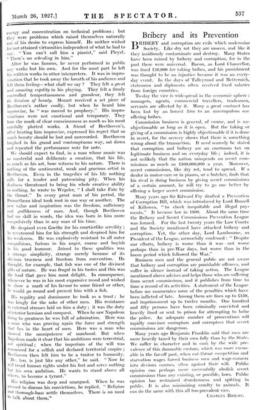Bribery and its Prevention
BRIBERY and corruption are evils which undermine Society. Like dry rot they are unseen, and like it they insidiously contaminate and destroy. Many States have been ruined by bribery and corruption, for in the past these were universal. Bacon, as Lord Chancellor, was fined £4.0,000 for taking bribes, and his punishment was thought to be an injustice because it was an every- day event. In the days of Talleyrand and Metternich, statesmen and diplomats often received fixed salaries from foreign countries.
To-day the vice is widespread in the economic sphere : managers, agents, commercial travellers, tradesmen, servants are affected by it. Many a great contract has been lost by an honest firm to an unscrupulous one offering bribes.
Commission business is general, of course, and is un- objectionable as long as it is open. But the taking or giving of a commission is highly objectionable if it is done in secret, for the secrecy shows that there is something wrong about the transaction. It need scarcely be stated that corruption and bribery are an enormous tax on legitimate business and on everyday life ; indeed, it is not unlikely that the nation misspends on secret com- missions as much as £100,000,000 a year. Moreover, secret commissions, like dry rot, tend to spread. If a dealer in motor-cars or in pianos, or a butcher, finds that his rival is doing business by giving secret commissions of a certain amount, he will try to go one better by offering a larger secret commission.
Many years ago Sir Edward Fry drafted a Prevention of Corruption Bill, which was introduced by Lord Russell of Killowen, " to check inequitable and illegal pay- ments." It became law in 1906. About the same time the Bribery and Secret Commissions Prevention League was formed. For the last twenty years the Law Courts and the Society mentioned have attacked bribery and corruption. Yet, the other day, Lord Lambourne, as President of the League, sorrowfully confessed : " Despite our efforts, bribery is worse than it was—not worse perhaps than in pre-War days, but worse than in the boom period which followed the War." • Business men and the general public are not aware that bribery and corruption are punishable offences, and suffer in silence instead of taking action. The League mentioned above advises and helps those who arc suffering from secret commissions, and it publishes from time to time a record of its activities. A statement of the League before me enumerates sonic of the penalties which have been inflicted of late. Among them arc fines up to £150, and imprisonment up to twelve months. One hundred and fifty persons have been criminally convicted and heavily fined or sent to prison for attempting to bribe the police. An adequate number of prosecutions will rapidly convince corruptors and corrupters that secret commissions are dangerous.
Many years ago Benjamin Franklin said that men are more heavily taxed by their own folly than by the State. We suffer in character and in cash by the wide pre- valence of this damnable custom, which was more excus- able in the far-off past, when cut-throat competition and starvation wages forced business men and wage-earners into devious courses, often against their will. Public opinion can perhaps more successfully abolish secret commissions than any existing, or possible, laws. Public opinion has restrained drunkenness and spitting in public. It is also minimizing cruelty to animals. It can do the same with this all too-prevalent vice.
CHARLES






















































 Previous page
Previous page